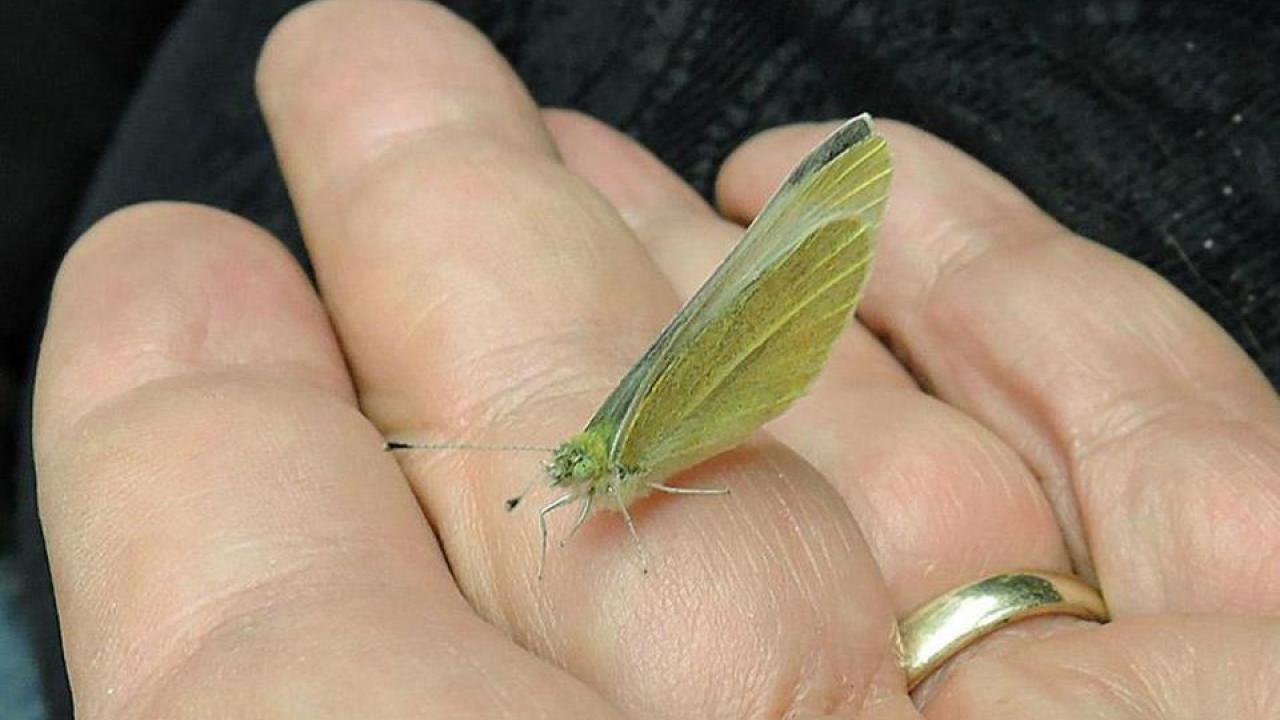
About That Butterfly Contest: ‘It’s Complicated’
Updated 8 p.m. Feb. 3: Professor Art Shapiro officially closed his Beer for a Butterfly contest tonight without a winner for the first time in the contest’s 49-year history. For the “complicated” reasons explained below, he had extended the contest until 5 p.m. Sunday (Feb. 2), then again to 5 p.m. today — but no one brought in a cabbage white butterfly (Pieris rapae). As for the beer that went unclaimed, Shapiro said he intends to go drink a pitcher with a friend later this week. On a scientific note, about the late date of the cabbage white’s first flight, Jan. 30, the latest since 2011 and the second latest since 2005, Shapiro had a warning: “This does not mean global warming is a hoax!”
Professor Art Shapiro predicted it: The cabbage white butterfly would be out this week, alerting his “posse” to their opportunity to win his annual Beer for a Butterfly contest — the prize going to the person who catches the first cabbage white of the new year.
And there it was today (Jan. 30), in the Putah Creek Nature Park in Winters, spotted by none other than Shapiro himself (as usual, given that he has won almost every year since he started the contest 49 years ago).

“At 11:16 a.m. I spotted a Pieris rapae dorsal basking on a malva leaf on the steep S-facing slope above the creek,” the professor of evolution and ecology said in a recap of his morning in the field. “It was a female. I could only approach it from below, and before I could close in, it detected me — and took off.
“It flew directly across the creek, where I could not follow. Apparently the shaded N-facing slope was not to its liking. At 11:20 it flew directly back across the creek, about 15 feet off the ground — and kept going. It went over the riparian trees and over the top of the slope, on a bearing that would take it into the middle of Winters (the town).
“Hoping it would return, I milled around fruitlessly for 90 minutes. The temperature rose to a balmy 66 Fahrenheit. I never saw it again — or anything else; no nymphalids.”
The contest?
Which brings us back to his contest. “It’s complicated,” he said in the headline on his recap.
“What to do about the contest? I knew this would happen someday — it almost has in the past! — and I had a protocol in place.”
What he wants every year is the date of the cabbage white’s first flight. He doesn’t need a voucher — or proof, in the form of a live specimen. He just needs the date, which he has for this year. It goes into his database for research measuring biological response to climate change. As the climate has warmed, the cabbage white’s first-flight date has gradually moved up — to a range of Jan. 1 to Feb. 22.
Live voucher
In his annual contest, though, he requires a voucher. “It’s the only way I can confirm the accuracy of other people’s records,” he said. “But I have perfect faith in my own sight records.
“So here’s the deal: Not having a voucher, which is required to win, I cannot declare myself the winner. On the other hand, now that I know the bug is out, there’s no scientific reason to want more records.”
But, in fairness to potential competitors, Shapiro is offering a pitcher of beer to the first person to catch a rapae in the contest area (Sacramento, Yolo and Solano counties) before 5 p.m. Sunday, Feb. 2.
And, get this: Shapiro said he will not try to beat anyone to a voucher! So everyone else gets a chance! If no one turns one in, he will declare the contest closed with no winner this year. “I think that’s fair,” he said.
“I can visualize a stream of thirsty people with nets converging on Winters as soon as this gets out!”
Media Resources
- This story first appeared in Dateline
